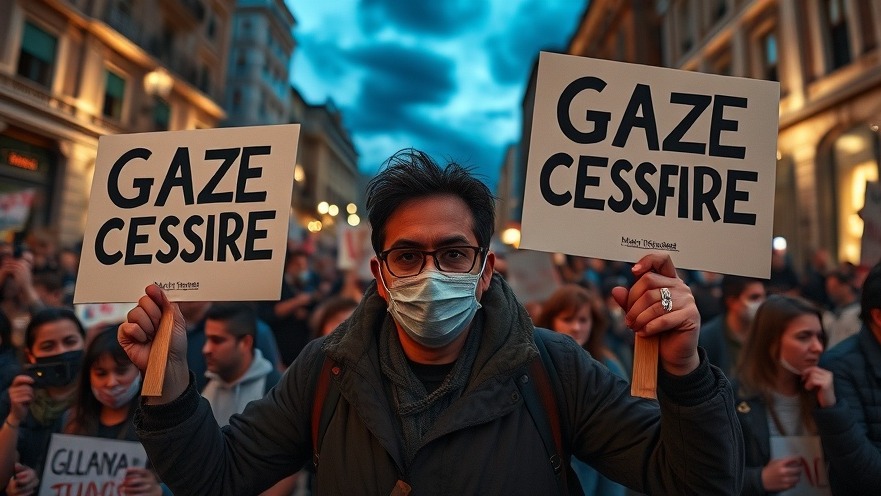
The Rising Tide of Dissent: Understanding the Protests in Israel
As tensions escalate in the ongoing conflict with Hamas, waves of protestors have gathered in Tel Aviv to call for a ceasefire in Gaza and the release of hostages. This grassroots uprising is not just a local response but a significant moment in Israel's complex socio-political fabric, meriting a deeper exploration of its implications.
In 'Israeli Protestors In Tel Aviv, Israel, Call For End To War In Gaza And Release Of Hostages', the discussion dives into the growing civil unrest in Israel, exploring key insights that sparked deeper analysis on our end.
Historical Context: A Nation's Struggle for Peace
The protests in Tel Aviv resonate with decades of conflict. Israel has been under continuous threat since its establishment in 1948, leading to cycles of violence and retaliation that have caused profound societal scars. The latest uproar reflects an overarching sentiment among many Israelis, particularly younger generations, who are exhausted from perpetual war and are yearning for long-lasting peace.
The Local Voices: Who Are the Protesters?
The protest has drawn a diverse crowd, uniting individuals from various political backgrounds—both men and women, young and old, secular and religious. This confluence highlights a growing consensus among Israelis that the status quo is untenable. Passionate chants echoing desires for an end to violence and the prioritization of life over conflict fill the streets. These voices signify a pivotal shift in public perception; many now consider the consequences of military actions on civilian lives, urging their leaders not to overlook the humanity in conflict.
The Role of Government: Leadership Under Scrutiny
The Israeli government, particularly Prime Minister Netanyahu's coalition, faces increasing scrutiny as protests grow. Critics point out that governmental decisions have both directly and indirectly contributed to the sustained hostility with Hamas. The perception that governmental tactics have favored extremism over moderation is particularly alarming for many Israelis, sparking demands for accountability and a more negotiation-focused policy.
Strategies for Peace: Potential Pathways Forward
In light of national dissent, analysts suggest that Israel must reconsider its approach towards Hamas. A strategy rooted in dialogue rather than military action may prove fruitful as many experts advocate for engaging moderate factions within Palestinian territories. The long-term solution lies in fostering relationships across borders based on mutual interests, leading towards a peaceful resolution that prioritizes human rights and stability.
Emotional Resonance: Stories from the Ground
Tales emerging from the protesters convey personal losses—family members missing or impacted by the ongoing conflict. These narratives serve to humanize the statistics reported in the media, illustrating that behind every number is a story fraught with pain and hope. Determined protesters hold placards adorned with the names of those taken hostage, their calls for action stark reminders of the family ties entwined in larger political narratives.
The Future: Insights and Predictions
Observing the current trajectory, experts emphasize that a resolution to the Israeli-Palestinian conflict might not come swiftly. However, the chorus of dissent present at protests throughout Tel Aviv may signal the beginning of a transformative shift in Israeli society. As voices advocating for peace grow stronger, the political landscape could potentially reshape towards a focus on diplomacy and reconciliation.
The International Perspective: Global Reactions
The protests have garnered international attention, igniting discussions around morality in warfare and human rights. As global leaders watch closely, the ongoing unrest in Israel may influence foreign policies concerning the region, shaping future international relations. Active engagement and support from global powers are essential for cultivating peace initiatives and rebuilding trust between conflicting parties.
Civic Engagement: The Importance of Public Demonstrations
Public protests serve an indispensable role in a democracy, allowing citizens to voice their grievances against governmental actions. The current protests in Israel reflect the healthy exercise of civic engagement and the vital role it plays in shaping policy outcomes. As protests continue, they may compel leaders to reconsider their strategies and adopt more humane approaches to governance.
Conclusion: A Call for Action Towards Peace
As students of history know too well, peace is not merely the absence of conflict; it is a process requiring commitment, dialogue, and active participation from all involved. The cries for justice and peace coming from Tel Aviv echo far and wide, compelling both local and international communities to reflect on the importance of humanity in conflict resolution. To support peace efforts, consider advocating for diplomacy over militarization in discussions with policymakers and your networks. Let your voice contribute to the far-reaching call for an end to hostilities.
As the situation evolves, staying informed and engaged is crucial. Understanding these dynamics is vital not only for those directly affected but for global citizens watching the unfolding narrative.
 Add Element
Add Element  Add Row
Add Row 



Write A Comment